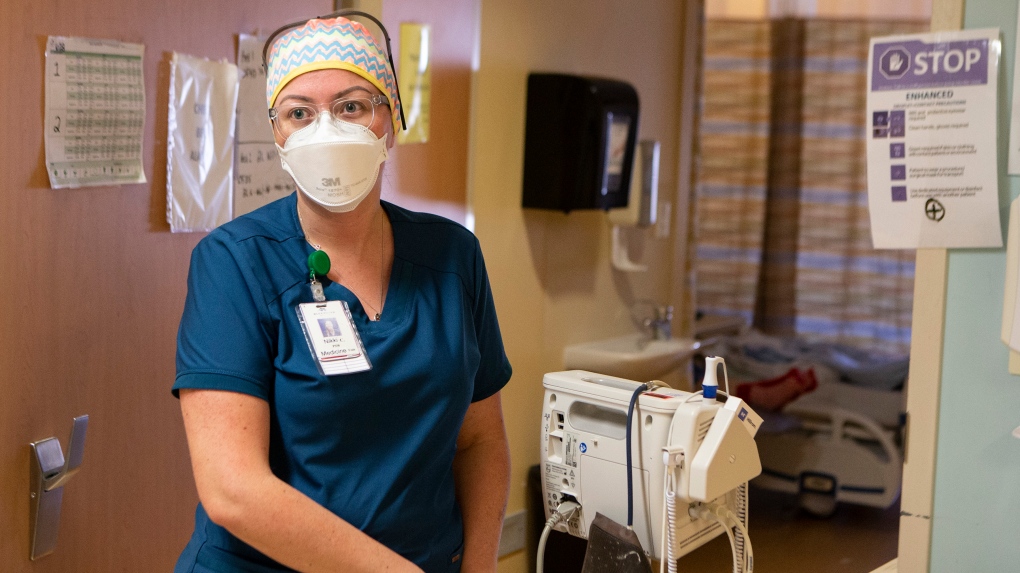Ontario government tables legislation to make PSW wage increase permanent
 Nicole Corry, a personal support worker who works with COVID-19 patients in the Medical Inpatient Unit at the Bluewater Health Hospital in Sarnia, Ont., is photographed on Tuesday, January 25, 2022.THE CANADIAN PRESS/Chris Young
Nicole Corry, a personal support worker who works with COVID-19 patients in the Medical Inpatient Unit at the Bluewater Health Hospital in Sarnia, Ont., is photographed on Tuesday, January 25, 2022.THE CANADIAN PRESS/Chris Young
The hourly wage increase that personal support workers (PSWs) in Ontario have received over the last two years of the COVID-19 pandemic could soon become permanent, according to a new piece of legislation tabled by the Progressive Conservative government on Tuesday.
If passed, the Pandemic and Emergency Preparedness Act, 2022 would see workers in long-term care and community care continue to receive a raise of $3 per hour while workers in public hospitals will keep their $2 per hour bump.
The government said that since Oct. 1, 2020, more than 158,000 PSWs and DSWs (direct support workers) have received the increase on a regular basis.
The base wage rate for a PSW in Ontario before the increase is $16.50 per hour.
Tuesday’s announcement comes two days before the benefit was set to expire. The government had been extending the measure for months at a time throughout the pandemic.
Also included in the legislation is a commitment to recruiting and retaining more doctors, nurses and PSWs by way of a $142 million investment through the “Learn and Stay” grant. More than half of that money will be used to expand the government’s Community Commitment Program for Nurses over the next two years. That program gives up to 1,500 nurse graduates each year the opportunity to receive full tuition reimbursement in exchange for committing to practice for two years in an underserved community.
Tuesday’s announcement is part of the province’s “plan to stay open,” which is being billed as a strategy to “build a stronger, more resilient health system that is better prepared to respond to crisis.”
“While the pandemic is not over, we are now in a place where we can use the lessons learned over the past two years and take actions to ensure our health system is even better, stronger and more resilient in the face of any future challenge,” Minister of Health Christine Elliott said in a news release.
The province is also introducing steep penalties for those who sell, or “offer to sell,” government-provided PPE and critical supplies and equipment (CSE). Sources tell CP24 that the fines will reach as high as $20,000 for an individual and up to $250,000 for a corporation.
A similar measure was brought in back in December following reports that COVID-19 rapid antigen test kits were being resold for what the government described as unfair prices.
The legislation would also require the province to develop an emergency management plan that is publicly available and revised at least every five years to deal with future public health emergencies.
The government has pledged to expand the domestic production of personal protective equipment and health-care infrastructure, if the bill is passed.
CTVNews.ca Top Stories

PM Trudeau 'surprised' provinces unanimous on accelerated defence spending: Ford
Ontario Premier Doug Ford says his fellow provincial leaders are united in pushing for Canada to meet its NATO defence spending targets ahead of schedule, and that Prime Minister Justin Trudeau was "surprised" to hear it.
Immigrants take to the streets to protest against the freezing of immigration programmes
In response to the freeze on immigration programmes announced by Ottawa, an organization that defends the rights of immigrants is organising a demonstration in front of the Montreal office of the Quebec Ministry of Immigration, Francisation and Integration early on Saturday afternoon.
Muskoka reacts to major snowfall, Highway 11 still closed
From road closures, power outages, weather declarations and nonstop shovelling, Muskoka residents were faced with nearly a metre of persistent snowfall on Saturday.
Beef prices reach record highs in Canada
The cost of beef continues to rise, reaching record highs on grocery store shelves ahead of the busiest time for many grocers and butchers before the holiday season.
A man hid 5 treasure chests worth more than US$2 million across the United States. Here’s how to find them
Inside the chests, searchers can look forward to hopefully locating items such as rare Pokémon cards, shipwreck bounty, sports memorabilia, gold and precious medals.
Pedestrian killed by Via Rail train near Kingston, Ont.
Regular rail traffic has resumed with severe delays.
Shopping on Shein and Temu for holiday gifts? You're not the only one.
Welcome to the new online world of impulse buying, a place of guilty pleasures where the selection is vast, every day is Cyber Monday, and an instant dopamine hit that will have faded by the time your package arrives is always just a click away.
Bail and promises of justice: The case of Canadians Daniel Langlois and Dominique Marchand murdered in Dominica
A year has passed since Canadians Daniel Langlois and Dominique Marchand were found dead in a burned-out car in Dominica, and there has yet to be justice for the philanthropists who were beloved by many on the island.
Canadian team told Trump's tariffs unavoidable right now, but solutions on the table in surprise Mar-a-Lago meeting
During a surprise dinner at Mar-a-Lago, representatives of the federal government were told U.S. tariffs from the incoming Donald Trump administration cannot be avoided in the immediate term, two government sources tell CTV News.
































